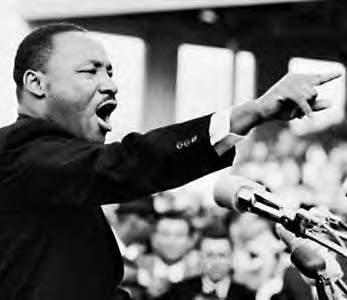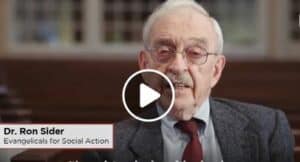
(Editor’s Note: This piece was first delivered on April 15, 2013 to a gathering commemorating Christian Churches Together’s response to Martin Luther King, Jr.’s “Letter from a Birmingham Jail.”)
I am a very unlikely candidate to speak at this important occasion honoring Dr. King’s historic “Letter from a Birmingham Jail.” I came to this country from Canada 51 years ago on a student visa to do graduate study. My ancestors were certainly not free of racism, but they were not part of this country’s wrenching several hundred year history of slavery and racism. I simply do not have the personal connection that many of you do through a long line of ancestors personally involved, as oppressor or oppressed, in the centuries of living out American’s original sin. I am a recent immigrant.
But perhaps, that very fact makes me an appropriate voice today. For I represent the many millions of white immigrants who came to these shores over a couple centuries and then quickly benefited from the numerous advantages, spoken and unspoken, explicit and implicit, that white folks enjoyed in a nation where African-Americans continued to experience pervasive disadvantage and discrimination. Almost instantly, as a white immigrant, I began to experience the many advantages that white folks took for granted.
When I began my doctoral studies at Yale in 1962, there were not many African-Americans there. In fact, I might never have even been admitted if by 1962, the previous centuries of discrimination had already been eliminated and corrected and most African-Americans had the educational opportunities equal to what this farm boy from Canada had enjoyed.
During our last two years in New Haven, my wife and I rented an apartment from an African-American couple, Mr. and Mrs. Royster. Mr. Royster was a janitor at Yale, but his salary cleaning buildings for young people on their way to joining the American elite did not pay enough for him and his wife to own their own house or enjoy a decent middle-class lifestyle. So Mr. Royster had a second full-time job, working a total of 16 hours a day to secure an income that the parents of the Yale students whose rooms he cleaned would have considered modest at best.
Mr. Royster symbolized for me the racial and economic injustice of this land. But the Roysters helped my wife and me understand American racism in many ways. Their young, understandably angry twenty-something son was willing to educate a naïve white guy who was ready to listen. We sat with the Roysters the night that Dr. King was martyred and tasted some of their pain. What we learned from the Roysters helped set my wife and me on a journey to understand and help overcome the racism we were slowly beginning to understand. Today, I want to thank them, and our black neighbors in North Philadelphia and the Germantown section of Philadelphia where we lived for more than 40 years, for all that they taught us.
We sat with the Roysters the night that Dr. King was martyred and tasted some of their pain. What we learned from the Roysters helped set my wife and me on a journey to understand and help overcome the racism we were slowly beginning to understand.
I stand here today, as one of the millions of white immigrants to this land who have benefited from the nation’s white racism, determined not only to confess our sinful complicity in this racism, but also determined to continue the struggle to build the beloved community. But I am not just a white immigrant, I am also a white evangelical. And we all know that white evangelicals have often played a particularly prominent, sinful role in America’s long racist history.
Yes, I know white evangelicals were among the prominent abolitionist leaders of the nineteenth century. But other white evangelicals were among the harsh practitioners and intellectual defenders of slavery. When Dr. King led his courageous nonviolent campaign against segregation, white evangelicals, with only a very few exceptions, were at best silent and often clearly hostile. When the courts outlawed segregation in the schools, many white evangelicals set up racist private schools. When politicians used subtle racist appeals, white evangelicals seldom objected and often joined the campaign. I confess these sins of myself and my people and ask for forgiveness.
To this day, white evangelicals tend to understand racism in only personal terms and fail to understand the structural aspects of racism. We still have much to learn from Dr.King’s insistence that we must deal not just with the symptoms, but also with the causes, especially the structural causes.
The long racist history of many white evangelicals makes it perfectly clear why African-American Christians proudly call themselves “Bible-believing” but hardly ever describe themselves as evangelical. In our frequently similar piety, songs, revivals, emphasis on personal conversion, desire to be biblical, and even fundamental theology, white evangelicals and black Christians are probably closer than any other two groups of American Christians. But the two groups have very little interaction. And they certainly vote differently. Until white evangelicals not only repent of their racist past but also act vigorously to live in faithful, non-racist ways, one cannot expect anything to change. My hope and prayer is that white evangelical participation in this response to Dr. King’s historic letter will be one substantial step in overcoming a sinful divide and in leading to a new understanding and cooperation.
Until white evangelicals not only repent of their racist past but also act vigorously to live in faithful, non-racist ways, one cannot expect anything to change.
White evangelicals often have the right words. We correctly highlight key areas where we solemnly resolve to act. We rightly say that we must end the gross injustice where abysmally inadequate, urban, largely minority schools exist alongside excellent, largely white suburban schools. We rightly insist that we must change a judicial system that imprisons and devastates a disproportionate number of young African-American men. And we wisely resolve to work together to learn how to expand the use of Dr. King’s daring, creative use of nonviolent methods.
But words alone are totally inadequate. Our words will remain cheap and empty unless we allow God to move us to new, more vigorous action. I pray that we will resolve to allow the Risen Lord Jesus to blow through our lives and actions, so transforming us that in the future, our children will say: Thank God that the Christian response to Dr. King’s prophetic vision truly energized a new movement of justice, reconciliation and nonviolent peacemaking. Please God, make that happen.
Ron Sider is the Founder and President Emeritus of Chrisians for Social Action.


